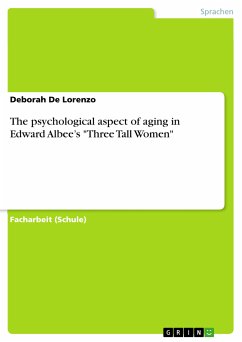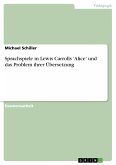Facharbeit (Schule) aus dem Jahr 2013 im Fachbereich Didaktik für das Fach Englisch - Literatur, Werke, , Sprache: Deutsch, Abstract: In the course of a human’s life a person goes through different physical and psychological stages and as the body becomes older the mind follows and vice versa. Already Greek and Roman philosophy discussed negative and positive aspects of different stages of human life. The first theoretical disquisitions on human psychological development were composed as early as in the 18th century. During this time Johannes Nikolaus Tetens described human development as a lifelong process including gain and loss and affected by sociocultural aspects; a process that therefore can be influenced. The Belgian mathematician Adolphe Quételet dealt with the development of skills and collected empirical data on the course of human life. He did not base his work only on statistics about physical aspects, such as height, weight and strength but also and more importantly on psychological variables, like emotions and intellectual potential. He also covered how historical events influenced aging, hence how the psyche and emotional condition of a person influence how old people become (see Lang/Martin/Pinquart: Entwicklungspsychologie – Erwachsenenalter, p.14). It is apparent that the interest in the human psyche and its effect on aging as a process were always of scientific concern. It is something we face daily. Edward Albee’s Three Tall Women perfectly represents the issue of developmental psychology. One protagonist is being portrayed by three versions of herself at different stages of her life and as a result the development of that protagonist becomes clear. An array of changes in her behavior and in her way of thinking can be seen. The most important point of the protagonist’s unfolding, just as Johannes Nikolaus Tetens describes, lies in the influence of one´s social surroundings (see Lang/Martin/Pinquart: Entwicklungspsychologie – Erwachsenenalter, p.14). The topic “The psychological aspect of aging in Edward Albee’s Three Tall Women” focuses on the protagonist’s social development as she gets older. In this paper the character of the protagonist will be analyzed and the courses of events in her life which lead her to become the person she turns out to be in the end. Following that the most essential themes of the play will be analyzed on the background of psychological aspects. But at first there will be a brief section of information on the playwright and the play itself.
Bitte wählen Sie Ihr Anliegen aus.
Rechnungen
Retourenschein anfordern
Bestellstatus
Storno









